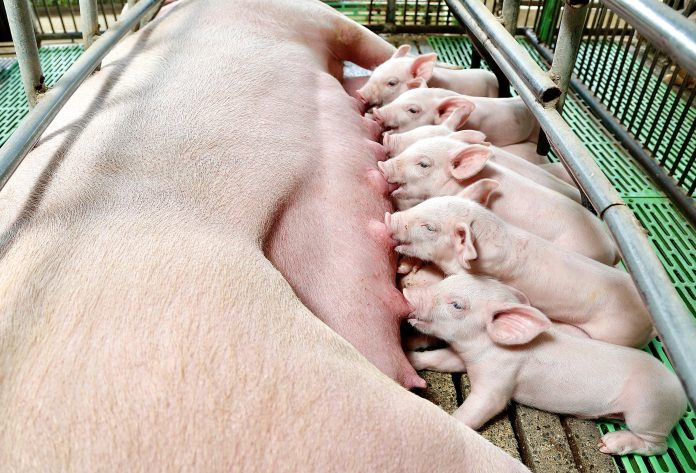Humane Society of the United States (HSUS) filed a lawsuit against Smithfield Foods, the world’s largest pork producer, for misleading consumers about animal abuse in its supply chain.
The lawsuit alleges that Smithfield Foods is misleading customers about the company eliminating gestation crates for mother pigs. The metal cages used to house the pigs are barely larger than the animals’ own bodies and prevent them from even turning around. The reality is that the company never actually eliminated gestation crates, but rather simply reduced the amount of time it forces pigs to spend locked inside of them.
Gestation crate confinement has been seen as a notorious practice by many consumers for decades. Ten states have passed laws to restrict or ban the practice, and some states have even banned the sale of pork coming from gestation crate operations. In addition, major restaurant, retail, and foodservice companies have adopted their own policies to eliminate gestation crates from their supply chains, citing customer concern.
“Smithfield Foods misleads the public about how it treats its pigs,” said Kitty Block, President and CEO of HSUS. “Smithfield Foods widely celebrates that it has eliminated gestation crates and transitioned all of its mother pigs on company-owned farms to group housing—a move it said was motivated by consumer demands. But in reality, the company’s ‘group housing’ keeps pigs locked in gestation crates for a significant part of their lives. These contraptions remain standard at Smithfield Foods despite its claims to the contrary, while the intelligent animals inside them cannot even turn around and they gnaw on the bars of their crates until their mouths bleed. The public deserves to know the whole truth about the treatment of animals at Smithfield Foods, and our lawsuit intends to hold the company accountable.”
In 2007, Smithfield Foods promised to phase out gestation crates on all company-owned farms within a decade, replacing the individual cages with a system where mother pigs are housed in groups. Repeatedly the company has claimed to be eliminating its use of these cages:
-
Smithfield Food’s 2007 press release specified that after its customers “made their views known on the issue” the company would be “phasing out” gestation crates and “replacing” them with group housing.
-
Its 2007/2008 Corporate Social Responsibility report explicitly claimed the company was converting to gestation “stall-free” production.
-
Its 2012 Integrated Report asserted that it was “eliminating” the use of gestation crates.
-
Other Smithfield Foods messaging—such as in social media posts—also touts the company’s work “eliminating” gestation crates.
-
A 2018 Smithfield Foods press release claimed: “Smithfield Foods delivers on decade-old promise to eliminate pregnant sow stalls in US.”
-
In Smithfield Foods’ latest Sustainability Report, the company claims to “maintain group housing for all pregnant sows on company-owned farms globally.”
-
In its recent social media posts, Smithfield Foods boasts to keep animals “comfortable” and to “ensure the welfare of our animals” including by having “group housing on all of our company-owned farms.”



